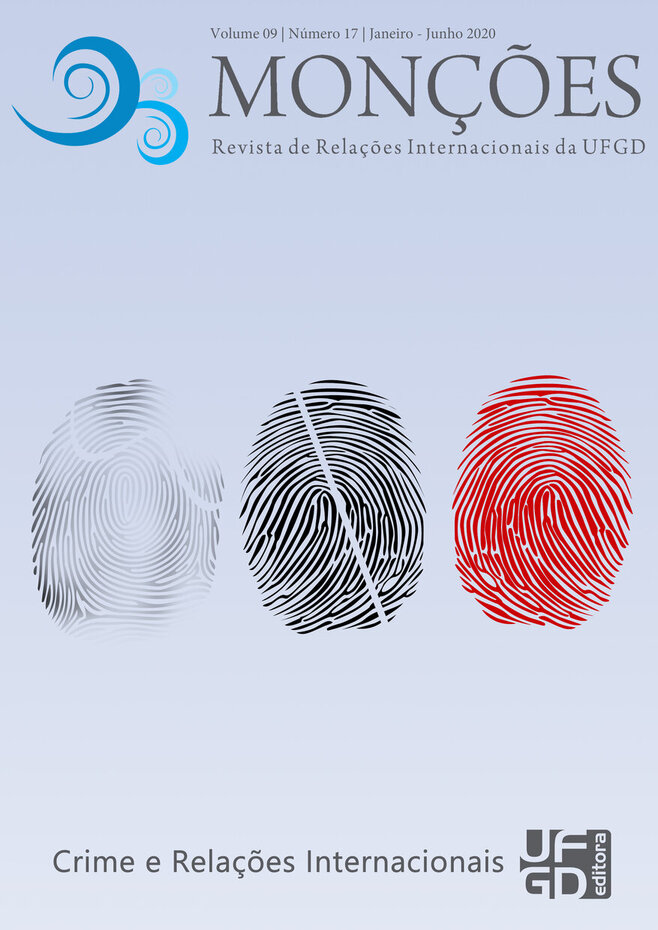Wanted: crime in International Relations
DOI:
https://doi.org/10.30612/rmufgd.v9i17.12852Keywords:
Crime. Criminalization. International Relations.Abstract
This article aims to understand the politics of the criteria through which crime has come to be constructed as a legitimate object of knowledge within the field of International Relations (IR). First, we show that discussions on “new wars” and “transnational organized crime” take up crime as an object of IR only insofar as it crosses national borders. Next, we go through approaches on global policing and on the security-development nexus, showing that these analyses remain wedded to border-crossing as a criterium of objectification. The article then turns to literatures exploring the war/crime boundary and the work of transnational technocracies to pose questions both to the inside/outside boundary organizing IR and to the set of agents involved in processes of criminalization. By reading the interconnectedness between State, penal apparatus, and the international, we argue that the control of populations is a condition of possibility of the international – and vice-versa. Thus, the article confronts the erasure of the “domestic” work of the penal apparatus as not concerning the discipline of IR and encourages engagements with critical studies on criminology as an entry point to interpret processes of criminalization and their connection with practices of inclusion/exclusion in global politics.
Downloads
References
ALBANESE, Jay S. Deciphering the linkages between organized crime and transnational crime. Journal of International Affairs, v. 66, n. 1, p. 1-16, 2012.
ALEXANDER, Michelle. The New Jim Crow. Nova York: The New Press, 2012.
ANDREAS, Peter; NADELMANN, Ethan. Policing the Globe: criminalization and crime control in International Relations. Oxford: Oxford University, 2006.
ARNSON, Cynthia J. The Political Economy of War: situating the debate. In: ARNSON, Cynthia J.; ZARTMAN, I. William (eds.). Rethinking the Economics of War: the intersection of need, creed, and greed. Baltimore, MD: Johns Hopkins University, 2005, p. 1-22.
BERGERON, James. Transnational Organised Crime and International Security: a primer. The RUSI Journal, v. 158, n. 2, p. 6-9, 2013.
BIGO, Didier. Globalized (in)security: the field and the ban-opticon. In: BIGO, Didier; TSOUKALA, Anastassia (eds.). Terror, Insecurity and Liberty: illiberal practices of liberal regimes after 9/11. Nova York: Routledge. 2008, p. 10-48.
BIGO, Didier. Sociology of Transnational Guilds. International Political Sociology, v. 10, n. 4, p. 398-416, 2016.
BORGES, Juliana. Encarceramento em massa. São Paulo: Pólen, 2019.
BOWLING, Ben; SHEPTYCKI, James. Global Policing. Nova York: Sage, 2012.
COLLIER, Paul. Doing Well Out of War: an economic perspective. In: BERDAL, Mats; MALONE, David M. (eds.). Greed and Grievance: economic agendas in civil wars. Boulder, CO: Lynne Rienner, 2000, p. 91-112.
DANNREUTHER, Roland. International Security: the contemporary agenda. Hoboken, NJ: John Wiley & Sons, 2007.
DUFFIELD, Mark R. Global Governance and the New Wars: the merging of development and security. Londres: Zed, 2001.
ELIAS, Norbert. The civilizing process. Oxford: Blackwell, 2000.
FOUCAULT, Michel. Security, Territory, Population. New York: Palgrave McMillan, 2007.
FOUCAULT, Michel. Vigiar e Punir. Petrópolis, RJ: Vozes, 2011.
HUNTINGTON, Samuel P. The Clash of Civilizations? Foreign Affairs, v. 72, n. 3, p. 22-49, 1993.
HUYSMANS, Jef. The Politics of Insecurity: fear, migration and asylum in the EU. Londres: Routledge, 2006.
JUNG, Dietrich (ed.). Shadow Globalization, Ethnic Conflicts and New Wars: a political economy of intra-state war. Londres: Routledge, 2003.
KALDOR, Mary. New and Old Wars: organized violence in a global era. Stanford, CA: Stanford University, 2007.
KELLY, Robert J.; MAGHAN, Jess; SERIO, Joseph. Illicit Trafficking: a reference handbook. Santa Barbara, CA: ABC-CLIO, 2005.
LEE, Rensselaer W. Transnational Organized Crime: an overview. In: FARER, Tom (ed.). Transnational Crime in the Americas: an inter-American dialogue book. Londres: Routledge, 1999, p. 1-38.
MALAGUTI, Vera. Introdução Crítica à Criminologia Brasileira. Rio de Janeiro: Revan, 2011.
MARTIN, Peter V. Confronting Transnational Crime. In: VIANO, Emilio (ed.). Global Organized Crime and International Security. Farnham: Ashgate, 1999, p. 25-32.
MÜNKLER, Herfried. The New Wars. Cambridge: Polity, 2005.
NADELMANN, Ethan. Cops Across Borders: the internationalisation of US criminal law enforcement. University Park, PA: Penn State University, 1993.
NEOCLEOUS, Mark. War Power, Police Power. Edimburgo: Edinburgh University, 2014.
OROZCO ABAD, Ivan. Combatientes, rebeldes y terroristas: guerra y derecho en Colombia. Bogotá, DC: Temis, 1992.
SHEPTYCKI, James. Criminology and the transnational condition: a contribution to international political sociology. International Political Sociology, v. 1, n. 4, p. 391-406, 2007.
VIANO, Emilio (ed.). Global Organized Crime and International Security. Farnham: Ashgate, 1999.
ZACCONE, Orlando. Indignos de Vida: a forma jurídica da política de extermínio de inimigos na cidade do Rio de Janeiro. Rio de Janeiro: Revan, 2015.
ZARTMAN, I. William. Collapsed states: the disintegration and restoration of legitimate authority. Boulder, CO: Lynne Rienner, 1995.
WALKER, R. B. J. Inside/Outside: International Relations as Political Theory. Cambridge: Cambridge University, 1993.
Downloads
Published
How to Cite
Issue
Section
License
- Os autores e autoras mantêm os direitos autorais e concedem à revista o direito de primeira publicação, com o trabalho simultaneamente licenciado sob a Creative Commons Atribuição-NãoComercial-CompartilhaIgual 3.0 Brasil. que permite o compartilhamento do trabalho com reconhecimento da autoria e publicação inicial nesta revista.
- Autores e autoras têm autorização para assumir contratos adicionais separadamente, para distribuição não-exclusiva da versão do trabalho publicada nesta revista (ex.: publicar em repositório institucional ou como capítulo de livro), com reconhecimento de autoria e publicação inicial nesta revista.
- Autores e autoras têm permissão e são estimulados a publicar e distribuir seu trabalho online (ex.: em repositórios institucionais ou na sua página pessoal) a qualquer ponto antes ou durante o processo editorial, já que isso pode gerar alterações produtivas, bem como aumentar o impacto e a citação do trabalho publicado, porém invariavelmente com o reconhecimento de autoria e publicação inicial nesta revista.


